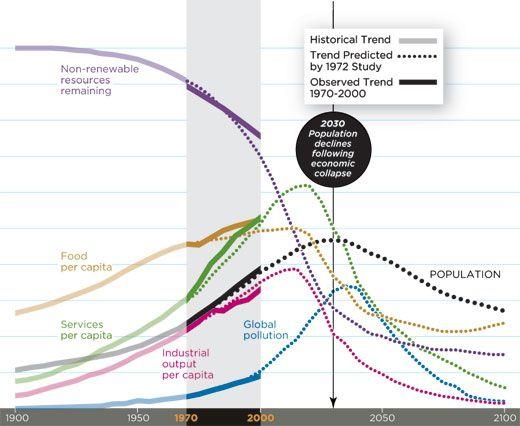"Decline Is Now Inevitable" - Dennis Meadows On 'The Limits To Growth'. Adam Taggart via PeakProsperity.com, via zerohedge.
Fifty years ago, an international team of researchers was commissioned by the Club of Rome to build a computer simulation of exponential economic and population growth on a finite planet.
In 1971, its findings were first released in Moscow and Rio de Janeiro, and later published in 1972 under the title The Limits To Growth. The report concluded:
Given business as usual, i.e., no changes to historical growth trends, the limits to growth on earth would become evident by 2072, leading to “sudden and uncontrollable decline in both population and industrial capacity”. This includes the following:
- Global Industrial output per capita reaches a peak around 2008, followed by a rapid decline
- Global Food per capita reaches a peak around 2020, followed by a rapid decline
- Global Services per capita reaches a peak around 2020, followed by a rapid decline
- Global population reaches a peak in 2030, followed by a rapid decline
The sooner the world’s people start striving for the second outcome above, the better the chance of achieving it.
Few reports have generated as much debate, discussion and disagreement. Though it’s hard to argue that its forecasts made back in the early 1970s have proved eerily accurate over the ensuing decades.
But most of its warnings have been largely ignored by policymakers hoping (blindly?) for a rosier future.
One of the original seventeen researchers involved in The Limits To Growth study, Dennis Meadows, joins us for the podcast this week. Fifty years later, what does he foresee ahead?
Decline is now inevitable.
We’re without any question moving into the remainder of a century which is going to see, by the end of these decades, a much smaller population, much lower level of energy and material consumption and so forth.
Whether we retain equity amongst people and avoid the more violent forms of conflict remains to be seen. But sustainable development is no longer an option.
This is one of the most important discussions we’ve ever recorded among the hundreds produced over the past decade.
No comments:
Post a Comment